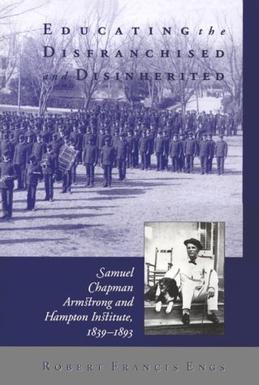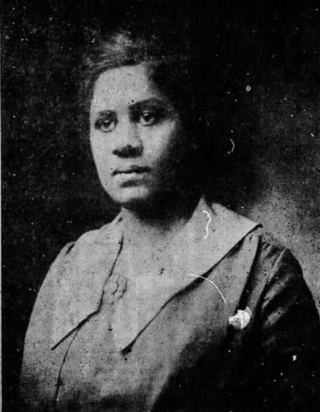
Hollis Burke Frissell (July 14, 1852 – August 5, 1917) was an American chaplain and college president. [1] He served as the second president of Hampton Institute. [2] [3]

Hollis Burke Frissell (July 14, 1852 – August 5, 1917) was an American chaplain and college president. [1] He served as the second president of Hampton Institute. [2] [3]
He served as the school's chaplain, vice-principal, and then principal until his death in 1917. He was also part of the General Education Board, Southern Education Board, Negro Rural School Fund, Anna T. Jeanes Foundation, Calhoun Colored School, Penn Normal, Industrial and Agricultural School, Virginia Manual Labor School for the Negro Reformatory Association of Virginia, Mandingo Association, and served as president of the New York Colonization Society. [4] [2] He corresponded with W. E. B. DuBois, Arthur Curtiss James, Kelly Miller, George Foster Peabody, John D. Rockefeller, President Theodore Roosevelt, and President William Howard Taft. [2]

He married Julia Frame in 1883 and they had one son. [2]

A library at the Tuskegee Institute built in 1932 was named for him. It was eventually renovated and renamed the Ford Motor Company Library.
The Museum of Modern Art has a platinum print photograph of Frissell. [5] He is depicted in a frieze by Evelyn Beatrice Longman at the Smithsonian Institution. [6]

Tuskegee University, formerly known as the Tuskegee Institute, is a private, historically black land-grant university in Tuskegee, Alabama. It was founded on Independence Day in 1881 by the state legislature.

George Foster Peabody was an American banker and philanthropist.

Samuel Chapman Armstrong was an American soldier and general during the American Civil War who later became an educator, particularly of non-whites. The son of missionaries in Hawaii, he rose through the Union Army during the American Civil War to become a general, leading units of African American soldiers. He became best known as an educator, founding and becoming the first principal of the normal school for African-American and later Native American pupils in Virginia which later became Hampton University. He also founded the university's museum, the Hampton University Museum, which is the oldest African-American museum in the country, and the oldest museum in Virginia.

Hampton University is a private, historically black, research university in Hampton, Virginia. Founded in 1868 as Hampton Agricultural and Industrial School, it was established by Black and White leaders of the American Missionary Association after the American Civil War to provide education to freedmen. The campus houses the Hampton University Museum, which is the oldest museum of the African diaspora in the United States and the oldest museum in the commonwealth of Virginia. First led by former Union General Samuel Chapman Armstrong, Hampton University's main campus is located on 314 acres in Hampton, Virginia, on the banks of the Hampton River.

Robert Russa Moton was an American educator and author. He served as an administrator at Hampton Institute. In 1915 he was named principal of Tuskegee Institute, after the death of founder Booker T. Washington, a position he held for 20 years until retirement in 1935.

Emancipation Oak is a historic tree on the campus of Hampton University in what is now the City of Hampton, Virginia in the United States. The large sprawling southern live oak, which is believed to be over 200 years old, is 98 feet in diameter, with branches which extend upward as well as laterally. It is designated one of the 10 Great Trees of the World by the National Geographic Society and is part of the National Historic Landmark district of Hampton University.
The John F. Slater Fund for the Education of Freedmen was a financial endowment established in 1882 by John Fox Slater for education of African Americans in the Southern United States. It ceased independent operation in 1937, by which time it had disbursed about $4,000,000.

James Edwin Campbell was an American educator, school administrator, newspaper editor, poet, and essayist. Campbell was the first principal of the West Virginia Colored Institute from 1892 until 1894, and is considered by the university as its first president.

Anna T. Jeanes was an American Quaker philanthropist. She was born in Philadelphia, the city where she gave Spring Garden Institute, a technical school, $5,000,000; $100,000 to the Hicksite Friends; $200,000 to the Quaker schools of Philadelphia; and $200,000 to the Home for Aged Friends, now known as Stapeley In Germantown, a retirement home where she spent the closing years of her life. In 1907 she transferred to the trusteeship of Booker T. Washington and Hollis B. Frissell the sum of $1,000,000 to be known as "The Fund for Rudimentary Schools for Southern Negroes" and to be used exclusively for the benefit of elementary negro schools in the South. The Jeanes Foundation worked in close cooperation with the General Education Board established by John D. Rockefeller.
The Jeanes Foundation, also known as the Negro Rural School Fund or Jeanes Fund, helped support education and vocational programs for African American in rural communities from 1908 to the 1960s. It was founded by Anna T. Jeanes with help from Booker T. Washington in 1907.

George Freeman Bragg was an African-American priest, journalist, social activist and historian. The twelfth African American ordained as a priest in the Episcopal Church of the United States, he worked against racial discrimination and for interracial harmony, both within and outside of his church.

Educating the Disfranchised and Disinherited is a 1999 biography of American General Samuel Chapman Armstrong and his associated normal school for freedmen, Hampton Institute, written by Robert Francis Engs and published by the University of Tennessee Press. The first full biography of its kind, the book portrays Armstrong as a complex politician and administrator in the postbellum period who balanced the needs of opposed parties surrounding the Virginia school: its African American students, Southern white neighbors, and Northern philanthropist funders. Previous works presented Armstrong in a polarized fashion, as either a savior or handicap for freedmen. The book emphasizes Armstrong's upbringing as a missionary in Hawaii in the development of his educational philosophy.

James Solomon Russell, born enslaved, in Mecklenburg County, Virginia, shortly before the American Civil War, became an Episcopal priest and educator. Russell founded Saint Paul Normal and Industrial School, which later became Saint Paul's College, and declined two elections to become bishop to continue directing that (now-closed) historically black college.

Della Irving Hayden (1851-1924) was an American educator. She founded Franklin Normal and Industrial Institute in Virginia in 1904.

Ora Brown Stokes Perry (1882–1957) was an American educator, probation officer, temperance worker, suffragist, and clubwoman based in Richmond, Virginia.

Florence Rising Curtis (1873-1944) was a library educator, chiefly known for her work as director of Hampton Institute Library School beginning in 1925. Curtis was born September 30, 1873 in Ogdensburg, New York. Her father was General Newton Martin Curtis and her mother was Emeline Clark Curtis. Curtis died October 6, 1944, in Richmond, Virginia. Curtis was known as a champion of education and training for Asian and African American library students through her work overseas and with the Hampton Institute Library School.
Helena Maud Brown Cobb was an American educator and missionary from Georgia. Born in Monroe County, Georgia, she attended Atlanta University and served as an educator and principal at many schools for African Americans in the state. She was also active in organizing and pushing for greater missionary opportunities for women within the Colored Methodist Episcopal Church.

James McHenry Jones was an American educator, school administrator, businessperson, and minister. Jones was the third principal of the West Virginia Colored Institute from 1898 until 1909 and is considered by West Virginia State as the institution's third president.

Americus Institute was a secondary school that operated in Americus, Georgia, United States during the late 1800s and early 1900s. The school was established in 1897 by the Southwestern Georgia Baptist Association in order to educate African American youth in the area. By the 1920s, the school was enrolling about 200 students annually and was considered one of the premier secondary schools for African Americans in the state. The school closed in 1932.

George Perley Phenix (1864–1930), was an American educator and university president. He served as forth president of Hampton Normal and Agricultural Institute, a historically Black university. He was the namesake of George P. Phenix High School, a segregated public secondary school for African-Americans affiliated with Hampton Institute.
![]() Media related to Hollis B. Frissell at Wikimedia Commons
Media related to Hollis B. Frissell at Wikimedia Commons